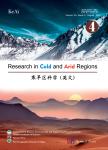Qualitative and quantitative phytochemical analysis of selected mosses with different alcoholic solvents
Qualitative and quantitative phytochemical analysis of selected mosses with different alcoholic solvents作者机构:Department of BotanyObafemi Awolowo UniversityIle-IfeOsun State 230103Nigeria Department of Biochemistry and Molecular BiologyObafemi Awolowo UniversityIle-IfeOsun State 230103Nigeria
出 版 物:《Research in Cold and Arid Regions》 (寒旱区科学(英文版))
年 卷 期:2019年第11卷第5期
页 面:382-388页
核心收录:
学科分类:081704[工学-应用化学] 07[理学] 08[工学] 0817[工学-化学工程与技术] 070303[理学-有机化学] 0703[理学-化学]
主 题:Archidium ohioense bryophyte Hyophila involuta Pelekium gratum phytoconstituents
摘 要:This study was conducted to investigate the qualitative and quantitative phytochemical content of the crude extracts of Archidium ohioense,Pelekium gratum,and Hyophila involuta with different alcoholic solvents(ethanol,methanol,Seaman s Schnapps,fresh oil-palm wine,and fresh Raffia-palm wine).The mosses were collected from their natural populations on the central campus of the Obafemi Awolowo University,Ile-Ife,*** yield of the extracts was weighed for all the solvents,and the qualitative and quantitative evaluations of the extracts were carried out using standard *** results of phytochemical analysis of the crude extracts from the mosses showed the presence of saponins,cardiac glycosides,triterpenes,alkaloids,flavonoids,and *** quantitative phytochemical analysis of the crude extracts showed that ethanolic extracts of Hyophila involuta had the highest flavonoid content(288.37±0.10 mg RE/g),and Raffiapalm-wine extracts of Hyophila involuta had the highest saponin content(224.70±0.02 mg/g),while the methanolic extract of Archidium ohioense had the highest cardiac glycosides content(63.71±0.14 mg/g),and the Raffia-palm wine extract of Hyophila involuta had the highest alkaloids content(102.50±0.12 mg/g).Raffia-and oil-palm wines were observed to be the most effective solvents for all the mosses studied,followed by Seaman s Schnapp,while methanol and ethanol were less *** study concluded that the extracts of the mosses studied contain pharmacologically active constituents that can be used for therapeutic purposes.



